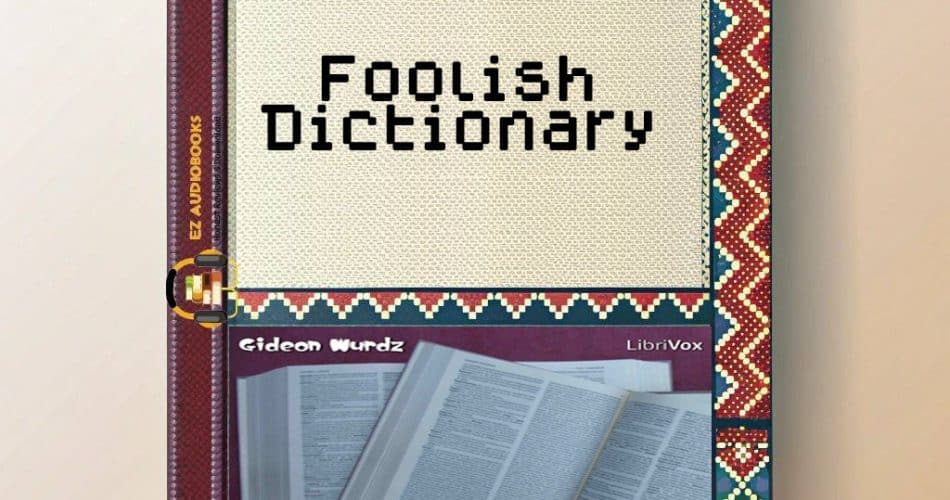Audiobook Sample
Listen to the sample to experience the story.
Please wait while we verify your browser...
- Title: Foolish Dictionary
- Author: Gideon Wurdz
- Narrator: Various
- Length: 01:46:00
- Version: Abridged
- Release Date: 01/01/2011
- Publisher: LibriVox
- Genre: Comedy, General Comedy
- ISBN13: SABFAB9780604
As someone who spends her days dissecting how storytelling evolves across media formats, stumbling upon LibriVox’s audiobook version of “The Foolish Dictionary” felt like discovering a peculiar time capsule. This 1904 humor piece by the mysteriously named Gideon Wurdz presents itself as a satirical reference work, but listening to it in 2024 reveals fascinating layers about how language, comedy, and social commentary have transformed over a century.
“The Audio Experience: A Community Theater Vibe”
The LibriVox production features multiple narrators, creating an effect reminiscent of my favorite experimental podcasts where different voices bounce off each other. While the audio quality varies (as expected from volunteer-recorded public domain works), there’s charm in the raw, almost community theater quality of the performances. Some narrators lean into the absurdity with exaggerated delivery, while others play it straight – an interesting choice that highlights the dictionary’s tonal contradictions.
“Content Analysis: When Wordplay Meets Zeitgeist”
What struck me immediately was how this work sits at the intersection of several trends I’ve studied in digital culture:
1. “The Dictionary as Canvas”: Just like modern meme formats repurpose familiar templates, Wurdz hijacks the authoritative dictionary structure for subversive humor. It’s the 1904 equivalent of an Instagram account parodying corporate jargon.
2. “Pun-Driven Humor”: Many definitions rely on wordplay that would feel right at home in today’s Twitter pun threads. The entry for ‘BACHELOR’ (‘a man who hasn’t a wife to scratch his back’) made me think of how viral humor still builds on these same linguistic mechanisms.
3. “Problematic Legacy”: As noted in the book’s description, some sections contain racial stereotypes that were unfortunately common in early 20th century humor. These moments serve as important reminders of how cultural artifacts reflect their time’s social blind spots – a phenomenon we still grapple with in digital archives today.
“Personal Connection: Audio’s Unique Revelations”
This experience reminded me of my “Project Hail Mary” podcast experiment where I compared different media formats. With “The Foolish Dictionary”, hearing multiple voices tackle the material created unexpected depth. The playful definitions for words like ‘KISS’ (‘a course of procedure, cunningly devised for the mutual stoppage of speech at a moment when words are superfluous’) land differently when delivered with a wink versus deadpan seriousness.
“Cultural Impact & Contemporary Parallels”
Comparing this to Ambrose Bierce’s more cynical “Devil’s Dictionary” (which I analyzed in my ‘Future of Stories’ episode on satirical reference works) reveals how humor styles diverge. Where Bierce bites, Wurdz mostly tickles. The closest modern equivalent might be “The Onion’s” ‘Our Dumb Century’ – both repackage era-specific humor through familiar formats.
“Recommendations”
This free audiobook is worth your time if:
– You’re interested in the history of humor formats
– You enjoy linguistic playfulness (think “A Way with Words” podcast fans)
– You’re researching early 20th century popular culture
However, listeners should be prepared to engage critically with the outdated social attitudes present in some sections.
“Final Thoughts”
As someone who analyzes how stories transform across media, I found this audiobook version adds valuable texture to Wurdz’s original text. The multiple narrators create a dialogic effect that the printed page can’t replicate – it’s almost like listening to a group of friends riffing on dictionary entries. While the humor sometimes shows its age, as a cultural artifact, it offers fascinating insights into the DNA of modern comedy formats.
Stay curious and keep exploring those digital archives!
– Sophie
Sophie Bennett

